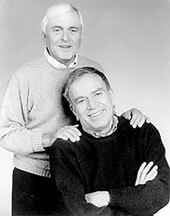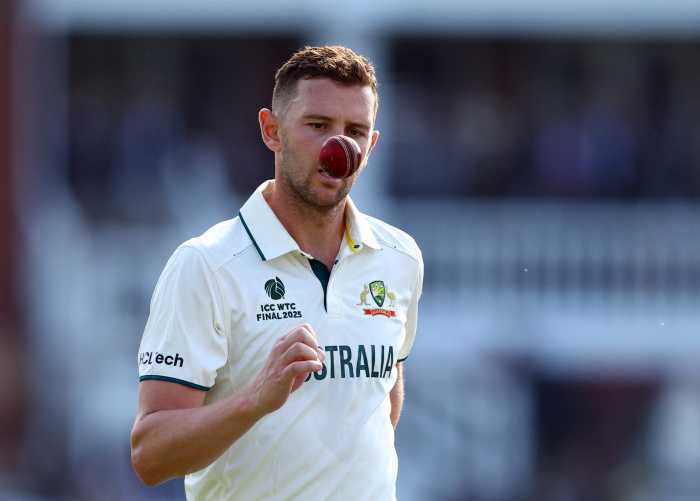Lyricist behind “Cabaret,” “Spiderwoman,” “New York, New York” was Broadway powerhouse
Relevant. That is the word that comes to mind at the end of a long day’s thinking about Fred Ebb on the day after he died.
I do not know what, even now, 38 years after the show’s Broadway premier, 59 years after the death of Hitler, could be more relevant than the biting words Ebb wrote for the songs of “Cabaret,” including “Willkommen,” of course, and the pastoral-to-terrifying “Hitlerjugend” military anthem “Tomorrow Belongs To Me,” and—as the grinning Kit Kat Klub emcee waltzes with his chimpanzee bed partner “If you could see her like I do… she wouldn’t look Jewish at all.”
Or what could be more relevant, for that matter—with that rotting old monster Pinochet still alive and unhandcuffed—than the fiery revolutionist defiance of “Over the wall” and “If not today, then tomorrow” and other hair-raising words by Ebb in the no less courageous Broadway musical, “Kiss of the Spider Woman,” that he and John Kander and Terrence McNally and Hal Prince (and, sublimely, Brent Carver and Chita Rivera) put together to hurl in the teeth of fascism and homophobia and obtuseness and brutality and prison cages everywhere in the world.
Not only that, but the adaptation of Manuel Puig’s novel and Hector Babenco’s film into a Broadway show was Ebb’s own idea. “ ‘Spider Woman’ came from Fred,” John Kander told this journalist a couple of years ago. “He said the title to me one day. Just once. I said, ‘Yes.’ That was it. No further conversation. We said the title to Hal Prince. He said, ‘Yes.’ And everybody else said: ‘A terrible idea.’”
It ran two-plus years on Broadway.
What’s even more interesting was that lyricist Ebb had thought “Cabaret” was a terrible idea—to make a musical from John Van Druten’s “I Am a Camera” and Christopher Isherwood’s “Berlin Stories”—when Prince first proposed it to the two young men who had started out with him, and an even younger Liza Minnelli, on “Flora, The Red Menace” in 1965.
Ebb didn’t see where the love interest was in the saga of Sally Bowles. He found out. In fact, he then gave its multiple love interests in twos, threes and various genders, song-language that wedded romance to irony to fatality.
Ebb’s lyrics spoke openly and frankly about sexuality, but he was also a man of his times. Last year, after Marc Shaiman and Scott Wittman, the songwriting team from “Hairspray,” celebrated their Tony with an onstage smooch, Ebb told Randy Shulman of Washington’s Metro Weekly, “I thought they made [a] spectacle of themselves, frankly. Your bedroom is not the screen. And it is also not the stage.” Anything he had to say about homosexuality, he continued, was in his songs.
Isn’t it amazing that this man who could write with flame could also create something as flash as all that jazz in “Chicago,” as fresh-breeze fragile and heart-lifting as “I met this perfectly marvelous girl / In this perfectly wonderful place,” as blood-stirring as our own city’s anthem.
I know that blockbuster has been exploited everywhere, even by the New York Yankees, and has been attacked as illogical, ungrammatical, intellectually banal, but I tell you, some years back when Frank Sinatra’s voice surged up in “New York, New York” just at the instant those Fourth of July fireworks burst over the East River, it was something to nearly swoon over, and remember.
I remember. Thank you, Fred. Thank you, John.
The two men were partners in creativity for more than 40 years, but never in domesticity, much less romance.
He’s gone now, Fred is—as ever, as always, much too soon. Deep in the New York Times obit one came across this: “In off hours, the young Mr. Ebb [just out of college] took in musicals, a form of which he was not especially fond. ‘They made me crazy,’ he said in 1976.”
I know just how he felt. For most of my life, as for most of my mother’s instructive theatergoing life before me, the dopiness and shallowness and, well, total irrelevance of all but the barest handful—”Pal Joey,” “Johnny Johnson,” “My Fair Lady”—of Broadway musicals that I was forced to grow up with bored the bejeezus out of me.
Fred Ebb, the lyricist, implanted relevance in that peculiar art form. And, indeed, made it art. With grace, with wit, with brains, with guts, with inventiveness to match, oh… Ira Gershwin. Larry Hart, Cole Porter.
Not long ago, on a last visit to “Cabaret,” I bumped between the acts into Karen Ziemba, the vital, dazzling star of “And the World Goes Round,” Kander & Ebb’s 1991 Off-Broadway scrapbook. “Fred Ebb,” said Karen Ziemba as we stood there, “is a great American poet.”
That’s about the size of it.

































